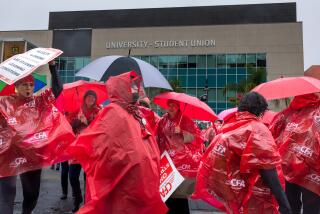New CSU Students Lacking Measles Shots to Get Them
- Share via
New students at California State University’s 19 campuses, including Cal State Fullerton, will have to show proof of measles and rubella immunization next school year or get a shot to protect them against the diseases, the university chancellor has ordered.
The program will be one of the most sweeping measles immunization plans for college-age students in the nation, officials said.
Although there have been no outbreaks of measles at any of the CSU campuses, the order was issued because several universities in the Midwest and East have reported widespread infections, said David Kagan, CSU dean of academic affairs.
Preventative Measure
“This is for purposes of prevention,” he said. “It doesn’t take that many cases for an epidemic to occur because of the infectious nature of the disease.”
Although most students were vaccinated against measles as children, their immunizations may have been “imperfect,” said Dr. Harley Estrin, director of Cal State Fullerton’s health center. In the classrooms and dormitories of college campuses, infectious diseases can spread quickly, he said. “That’s why the university-age population is so vulnerable,” Estrin said.
Adults afflicted with measles can develop potentially fatal complications, including pneumonia and encephalitis. Rubella--or German measles--poses a danger to the babies of pregnant women, officials said. The close quarters of college campuses can provide fertile conditions for the spread of infectious diseases, they said.
About 7,000 of Cal State Fullerton’s 22,000 students will be affected by the order, Estrin said. San Diego State University, the largest CSU campus, estimates the number at 10,000, as does the Long Beach campus. About 3,000 students will be affected at Cal State Los Angeles, which has an older student body, with few students living on campus, said an official there.
Proof Required
Under the order, issued by Chancellor W. Ann Reynolds, all students under 30 registering as new or readmitted students must present proof of immunization during the fall semester. The order also applies to all students who live in dormitories, attended elementary or high school in foreign countries, plan to work in hospitals or act as student teachers around young children, or are enrolled in nursing, medical technology and physical therapy courses, Kagan said.
Those who cannot prove they have immunity to the disease will have to receive a shot, offered free at student health centers, by the start of the spring semester, Kagan said. Medical waivers will be given to students who should not be injected with the live-virus vaccine, such as pregnant women and students with diseases that compromise their immune systems, such as AIDS or cancer.
People under 30 are especially vulnerable to the disease because most were immunized as children, officials said. Most older adults had measles as children and have a natural immunity to the disease.
The nine-campus University of California is contemplating a measles immunization program but so far has not taken any action, a spokeswoman said.
Little Student Reaction
Most Cal State health officials contacted said there has been little student reaction to the order, although Morse said the Cal State Long Beach student newspaper endorsed the move in an editorial.
The order also was applauded by Dr. Thomas Prendergast, Orange County Health Department epidemiologist.
Southern California is especially susceptible to measles outbreaks because of “the tremendous exchange of people,” through tourism and immigration, he said.
Orange County reported 14 cases of measles in 1985 and seven cases in 1984, he said. There was a rash of five cases in December and January this year at a junior high school and a grade school in Irvine he said.
All of the children who caught the disease had been immunized, but they had received the shot when they were between 12 and 15 months old, when the vaccine is not at peak effectiveness, Prendergast said.
More to Read
Sign up for Essential California
The most important California stories and recommendations in your inbox every morning.
You may occasionally receive promotional content from the Los Angeles Times.










